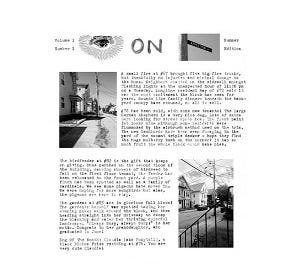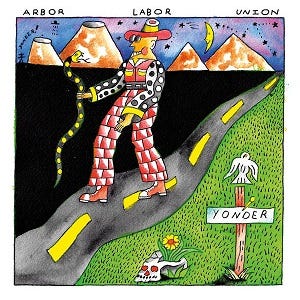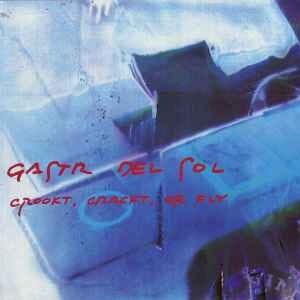RECENT LISTENING #31
Staubitz & Waterhouse, James Schroeder, ZZ Top, Sounds of Pamoja, Arbor Labor Union, Gastr Del Sol
STAUBITZ & WATERHOUSE Out and About LP (GERTRUDE TAPES) Loved their previous full-length, the CD-only Common Metals (well you know, CD/digital-only), even though it was just, like, untreated field recordings (I still think of it as a program of audio-only slow-cinema short films, and not a record album of music). Well this new LP Out and About is also just, like, untreated field recordings, but somehow more like punk rock, faster moving, and clearly shot on 16mm as opposed to Common Metals being definitely shot on HD. Birdsong, carsound, motorhum, motordrone, naturegrind, and general foregrounding of background create a deep mood, though it all briefly breaks late in side one for a “Jazz Conversation” (and not necessarily a very interesting one) taking place at a bar where employees are heard shoveling ice without speaking except for two glorious words three-fourths into the track when the establishment’s phone rings in the background and, instead of answering, one of them just says “fuck off.” Side two starts with “I Am Sitting in a Car” (the Alvin Lucier joke reminding that if Staubitz & Waterhouse do not actually make 21st Century Cinema as I cheekily insist, they do indeed make post-Cageian 21st Century Composition) and proceeds phenomenologically from there like the best field recordings do, until late in side two when the small sounds suddenly stop and an audience is heard breaking into enthusiastic applause; turns out the arc of the LP is ‘mostly untreated field recordings eventually seamlessly becoming a recording of a very intentional live noise/sound/music performance with side B track 3 “Live at Tubby’s”.’ This development from ‘real world’ via field recordings into ‘performance’ via “Live at Tubby’s” is imperceptible as edited, until the sound of live applause ruptures the illusion. I’ve since gone back and tried to listen very intently to Staubitz & Waterhouse’s live set at Tubby’s, but not once have I noticed the moment when the track begins in the midst of Side B. Even the sounds and tones resist my attention, constantly making me forget I’m listening to a live set, pushing me back into that strange audio world of untreated field recordings. Which, essentially, “Live at Tubby’s” is still an example of. Weird magic LP!
JAMES SCHROEDER Mesa Buoy LP (WESTERN RECORDS) James Schroeder is a Nebraska musician who you might’ve seen and/or heard playing second guitar in the David Nance Group over the last few years, both on tour and on records. I personally saw and heard him absolutely shred a set with the Nance Group at Chicago’s one and only Hideout on November 16th, 2018. He’s also a composer, bandleader, and engineer in his own write/right, and over the last few years has slowly assembled this record of compositions and improvisations with a cast of deep-Nebraska creative-music weirdos he calls the James Schroeder Sextet. Which creative music weirdos, you ask? And what does it sound like? Well, here’s what I wrote over on Instagram when I first heard this LP (jeez almost four months ago): “Schroeder cuts a solo LP of windswept mini-symphonic acid-western instrumentals, with pedal steel, rhodes, bass guitar, drums by another Nance Group long-timer in Kevin Donahue, cello by Megan Siebe (cf. Rake Kash and Citizen Electrical LPs on Gertrude Tapes), instrument builder Jay Kreimer a mysterious audio presence on 5 of the 8 tracks, and Nance himself playing guitar on 3 tracks.” This is a really good LP, and I can specifically attest to how lovely the trad/ballad/weeper pedal steel guitar instrumental “Neil Jung” is the seventh time you listen to it.
ZZ TOP Raw ('That Little Ol' Band from Texas' Original Soundtrack) (BMG RIGHTS MANAGEMENT) Speaking of killer guitar: this may not be a great ZZ Top album but ZZ Top are still a great band and therefore this album is still a great listen. It’s just the three of ‘em bashing it out live, as seen in the Netflix documentary that this album (as released by that killer underground record label “BMG Rights Management”) serves as the OST for. Billy Gibbons’ guitar tone is somehow still getting crazier and weirder. The rhythm section may not quite be as utterly locked in and precision-tooled as they used to be, but they’re still heavy as hell. RIP Dusty.
VARIOUS ARTISTS Sounds of Pamoja (NYEGA NYEGA TAPES) The most intense and craziest music since goregrind or whatever, unless you don’t think a raw-voiced non-English-speaking rap artist spitting and chanting one-liners over and over for eight straight minutes while barely taking a breath backed by a frenetic techno beat that sometimes changes swirling patterns but never stops or even slightly slows down once sounds like it would be intense and crazy.
ARBOR LABOR UNION Yonder LP (SOPHOMORE LOUNGE) One of the better spaced-out mellow/clean/groove rock band records I can think of from the last 10-20 years. People keep saying Meat Puppets when describing this band/record and yes, definitely — that’s why it’s one of the better spaced-out mellow/clean/groove rock band records I can think of from the last 10-20 years. What makes it different than straight Pups is a certain post-Lungfish drone/repetition aspect, where they will hang on a single repeated riff for longer than you might expect. They also fit into that wispy/whispery clean Tonstartssbandht vibe. I don’t mean to just list a bunch of bands, but it’s OK to sound like other bands when you’re also a very good band yourself. Arbor Labor Union are from Atlanta.
GASTR DEL SOL Crookt, Crackt, or Fly (DRAG CITY) I feel like heads love Upgrade and Afterlife the most, and then you’ve got your poptimist Camofleur contingent, both opinions understandable, but Crookt, Crackt, or Fly is the greatest Gastr Del Sol masterpiece of all for me. It was the first collaboration between Grubbs and O’Rourke, and in my estimation the last time it really clicked. With those subsequent albums, great as they were, the collaboration felt more partitioned. Maybe I just think that because Crookt essentially begins with an intense two-guitar workout, and I can only imagine the two of them alone on a soundstage, sitting in facing chairs and staring each other down while jamming hard on acoustics. But, before Crookt, Gastr was a Grubbs and Bundy K. Brown/John McEntire collaboration, really more of a Bastro rebrand than anything, and after Crookt it was O’Rourke saying “wow, now I can try this and this and this,” and with a guy like O’Rourke that’s pretty much an infinite list of possibilities, which can be overwhelming to the creative process and to a creative partner, especially when you’re as painstaking and perfectionist as O’Rourke self-admittedly is, which is maybe why Gastr Del Sol ground to a rather sudden halt just four years after Crookt. It is perhaps the one album where it feels like the music is playing them, instead of the other way around, the only chance they got to not overthink this suddenly vast and scrutinized “Chicago post-rock” landscape. Hell, might as well do a track-by-track, for which I’ll revisit my 24-year-old self, serving on the music-writing staff of a short-lived flyover-city alt-weekly in early 1994 when a promo cassette of Crookt, Crackt, or Fly (full-pressed label-run cassette, no J-card, still have it) was sent to the paper and assigned to me by the editor. I had no idea who the hell Gastr Del Sol was, and the accompanying one-sheet wasn’t much help either; I’m sure it referenced a few bands, and I’m sure I hadn’t heard of any of them yet. Maybe I didn’t even know what Drag City was at the time, though I definitely knew about Pavement and possibly Palace Brothers and Royal Trux. None of which mattered, because I instantly fell in love with the album from the very first time I put the cassette in and pushed play. How could I not when, after an intriguing one-minute intro called “Wedding in the Park” (over a bed of cricket sounds enter David Grubbs on voice and acoustic guitar, doing a short weird literary singer-songwriter thing, heavily influenced by Mayo Thompson, though I didn’t know that at the time either), it goes right into the aforementioned guitar showdown “Work From Smoke,” immediately ablaze for two minutes and thirty seconds of incredible avant/flamenco/punk/wtf acoustic guitar duets, a specific style and approach I’m not sure I’ve heard anywhere else before or since, after which highly extended intro move the track calms down into a change of pace, with more gentle and melodic guitar parts over which Grubbs sings soft enigmatic words like “two dogs approached/deep for dusk(dawn)/smoky tones pumped canine bellows/canine bellows,” his voice occasionally doubled by what sounds like an intriguing female vocalist. (Was Gastr stealing the letters outta Slint’s mailbox?) This vocal section goes on for two minutes, and then it’s back to more acoustic guitar duo showdowning, Grubbs and O’Rourke bobbing and weaving like boxers for another full minute-and-a-half, and then a long slow cinematic crossfade begins into an all-time exquisite six-and-a-half-minute fog-trope coda (sorry for that gratuitous Ingram Marshall reference) built from organ droning, perfect bass clarinet clouds, and hugely spaced vibraphone atonal-chord color-stabs, each one also absolutely perfect. The whole track of “Work From Smoke” clocks in at almost 13 minutes and I declare it to be the absolute pinnacle of what was and is called Chicago post-rock. Up next, “Parenthetically” goes back to that “Wedding in the Park” ‘abbreviated intro’ style, another enigmatic and indeed parenthetical koan of a song fragment, this one even shorter at only 51 seconds long, time enough for Grubbs to intone a couple more obtusely Thompsonesque lines, this time completely a capella, and then respond to himself instrumentally by pounding out a quick cyclic lo-fi solo piano riff, a subdued rhythmic relation to the cyclic guitar dervishing of “Work From Smoke.” Then comes the side A closer, the almost 8-minute-long “Every Five Miles,” another beautifully recorded and played track that is mostly an acoustic guitar duet, very similar to “Work From Smoke” but also clearly different, and if anything even more intense. Either way, the album retains this tense unaccompanied acoustic guitar duetting as a clear through-line, as a core motif. The guitars stay unaccompanied until at least the 4-minute mark of the track, but then things start a slow dissolve into a cinematic dream-sequence in which the acoustic playing gradually loosens its tight rhythmic grip and is bled over with obtuse electric guitar overdubs. It’s a hell of a closer to a hell of a side, and we’re only halfway done… side two starts with the most traditional vocal piece on this mostly instrumental album, “Thos Dudley Ah! Old Must Dye,” with an actual series of sung verses, Grubbs’ lyrics and vocals retaining those wide intervallic post-Thompson melodies, but here with much more of that nervous cracked Louisville plain-speech approach we know so well from Slint’s Spiderland, not to mention an overall Southern Gothic dirge feel much like something from the Palace Brothers debut There Is No-One What Will Take Care Of You, pushed even further when, in between each verse, the track crumbles into free jazz chamber music, subtly cleaved open by grinding arco bass playing, which isn’t credited so was probably played by either Grubbs or O’Rourke. Either way it’s amazing. Next track is another shortie (1:29) that would probably be the leadoff single if there was one, “Is that a Rifle when it Rains?” A crazy odd-time-signature indie-prog (aka math rock) guitar riff played by a full band with John McEntire on drums, the first appearance of a drumkit on the record (spoiler alert, the second and last appearance is coming right up). Even in less than 90 seconds overall, the whole thing takes on an alien android sheen during its manic too-short lock-groove coda. Next track is “The C in Cake,” famously the namesake for the band The Sea & Cake as misheard by Sam Prekop. The track itself is an all-instrumental and mostly solo guitar piece, almost four full minutes long, more of that flamenco prog-punk mystery music that only this album seems to have ever truly pulled off, a genre of one, and then McEntire comes right back for the epic album closer “The Wrong Soundings,” at 14:49 even longer than its Side A counterpart “Work From Smoke,” yet another brilliant and confounding piece that perfectly blends current guitar-riff moves and historical new-music approaches, here with another opening solo skittery proggy guitar riff, this time not nearly as long as other solo-and-duo guitar stretches on the album, and the full band suddenly interrupts by tearing into another looped math-rock riff, very similar though clearly different than the “Rifle” riff that came just before, and just as quickly as they tear into it, they duck out of it, switching into another no-drumkit beautiful extended fog-trope piece of 20th Century Composition, the guitars staying flamenco but only via softly murmuring arpeggios that stay on one strange droning chord, this augmented by very subtle and warm electronics (true synth burble), while the foreground is taken by perfect spacious new-music rattle-and-hum percussion. This lasts for well over five exquisite (replica of eternity) minutes, and then after a quick restating of that opening solo riff, the math rock pranksters (with McEntire) jump-cut back into the picture, throwing out more of those jagged riffs then immediately letting them falter into crumbling deconstruction, which jump-cuts back into more solo playing, and then jump-cuts into a new duo guitar riff, a twisty loping loop-style outro. Grubbs and O’Rourke lock it in, McEntire joins up, and they groove it for almost six minutes before hitting a final groaning and ringing chord. There is one more minute left in the track, during which the album comes to a perfect and appropriate close with more duo guitar interplay, this time at its softest, most enigmatic, and ethereal. Anyway, I love this album for lots of reasons, many of which I’ve just detailed, but I think the main one is that it’s just an album with a bunch of killer guitar riffs.








